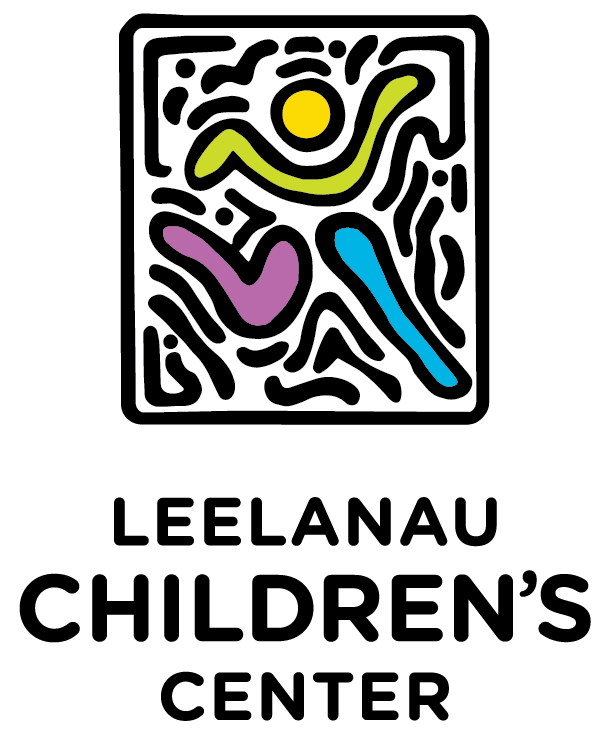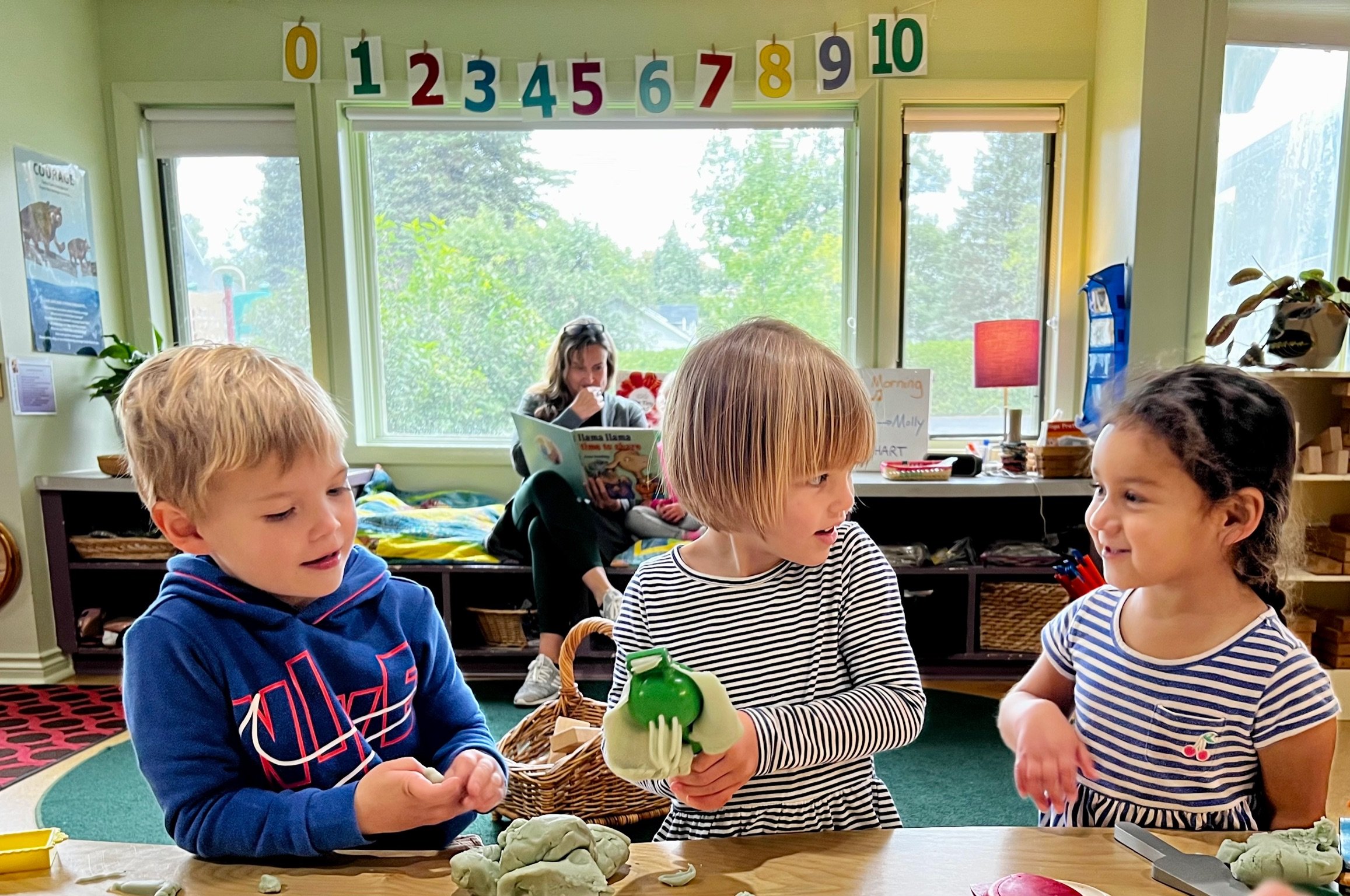Leelanau Children’s Center Approach
Play-Based Learning
Play is the essential ‘work’ of the young child. Through play, young children explore, learn, and consolidate knowledge while stretching into every developmental domain: physical, language, cognitive, social-emotional, sensory, and aesthetic. We believe that children in group settings should experience lightly structured days that allow them to feel safe and supported while exposing them to a wide variety of developmentally appropriate opportunities.
LCC uses a play-based educational approach with a focus on hands-on learning. LCC provides open-ended opportunities for children to engage in uninterrupted play - play that the children design and control. An important role of the LCC teachers is to ensure that the environment optimally supports the play schemes of the children and to support the play without interrupting it. We believe that:
Being able to fully engage with peers can scaffold children’s development more readily than teacher-directed activities;
Play helps kids learn how to regulate emotions, solve problems, and make plans.
Authentic, beneficial children’s play is enjoyable, voluntary, and self-initiated;
Play should be spontaneous and flexible, involving problem-solving that doesn’t have one right answer and may include multiple or changing solutions.
Competence, autonomy, and personal connection: these are the building blocks of a play-based education where children are allowed to become competent by having the time and space to autonomously ask and answer their own questions within the context of a caring community.
LCC uses Emergent Curriculum. The themes and topics that children and teachers explore together will emerge from children’s questions, interests, and reoccurring play themes. The sources to which children turn for information gathering will eventually translate into academic disciplines such as math, language, science, and creative arts.
Focus on social-emotional development
Leelanau Children’s Center is devoted to the tending of relationships because relationships are the single most effective vehicle for change. LCC is rooted in the belief that positive relationships are the most important aspect of any care and education setting.
LCC staff are committed to nurturing warm and meaningful relationships with the children and families in their groups. Social-emotional development is the foundation upon which all subsequent development rests. Teaching and facilitating pro-social skill development forms the core of each and every day at LCC. We help children learn the skills and behaviors used to play and learn with others, help children understand their feelings and those of others, and support their growing independence in solving personal and social dilemmas.
Helping our young children with self-regulation is an important LCC goal. When asked about school readiness skills, many teachers say children who succeed in the early elementary grades know when and how to control their impulses. They can follow through when a task is difficult and listen to directions for a few minutes. These skills are linked to self-control. We begin to help children gain the tools they will need to work on this challenging skill needed to learn in a structured group environment.
There are many “opportunities” to experience social conflict throughout a child’s day at LCC. It is not our goal to prevent all conflict, nor to protect children from experiencing disappointment, nor to resolve all conflicts for children. Instead, it is the teacher’s role to structure conflict resolution and problem-solving strategies for children and to help them become more independent in positively handling them.
Routines and Rituals
We create and follow consistent routines and create rituals that support community building every day. We start the day with activities to connect children to teacher and to each other both in large and small groups. Classroom communities spend a lot of time getting to know each other, how they are alike, and how they are different.
Outside Play
We see our outdoor environment as an extension of the classroom, providing children with the opportunity to appreciate and explore the natural environment while engaging in the process of inquiry. Some of the experiences children have in our outdoor playscape include utilizing loose parts, building materials and large motor equipment, discovering natural items and critters, observing changing weather and environment, and participating in growing food and flowers in our garden beds. We go outside every day! In all kinds of weather and for long periods of time. Our Northern Michigan weather gives kids a lot of practice in selecting and putting on the appropriate great for the day.
Developmental Assessment
At LCC assessment is not synonymous with testing. It is an ongoing, authentic observation and gathering of information throughout the year to help us understand a child’s individual development and how to best support them. We use a research-based tool called Teaching Strategies GOLD. The learning objectives cover 10 areas of development and learning, including broad developmental areas, content area, and English language acquisition when appropriate.
Food and Nutrition
Nutritious food is a central component of the Leelanau Children’s Center programs, as growing bodies and brains require great nutrition to fuel optimal development. Children participate hands-on in the food program by tending to our gardens, visiting local farmers markets to learn about what grows seasonally in our community, and helping prepare meals from scratch with real ingredients. We eat family-style in our classrooms and teachers have lively conversations with children supporting social connections, sparking curiosity about what’s on the table, and encouraging kids to try new foods and eat healthy portions.
Research on the life-long benefits of a healthy diet and developing positive attitudes about a variety of foods is clear; we know people are healthier when they eat well. Research also states that these habits are formed early when children are young. LCC provides morning snack, lunch, and afternoon snack, which includes milk, protein, fruits, vegetables, and carbohydrates.
Read more about our Food Program on the Meals at LCC page.
Including Families
A positive family partnership is very important at LCC and each child’s best interest is our shared concern. This partnership provides the continuity and support that children need to feel safe and secure enough to explore, play, enjoy, and learn in our care. We have an open-door philosophy. We invite and encourage families to join us in many ways. Individual children are seen as part of a family and we hope to include and support the family as a whole. Teachers and the Program Director maintain regular contact with families. Contacts include home visits, daily conversations, Brightwheel posts, family events, and parent-teacher conferences.
Team Teaching and Ratios
LCC recognizes that the ratio of teacher to child is important. We have a 1:7 ratio with a maximum group size of 14 preschool children in a classroom. We use a team teaching model with 2 qualified teachers for each class. Each child will have a primary teacher who will be the main contact for the family and will conduct ongoing observation, developmental assessments, and planning for that child.








